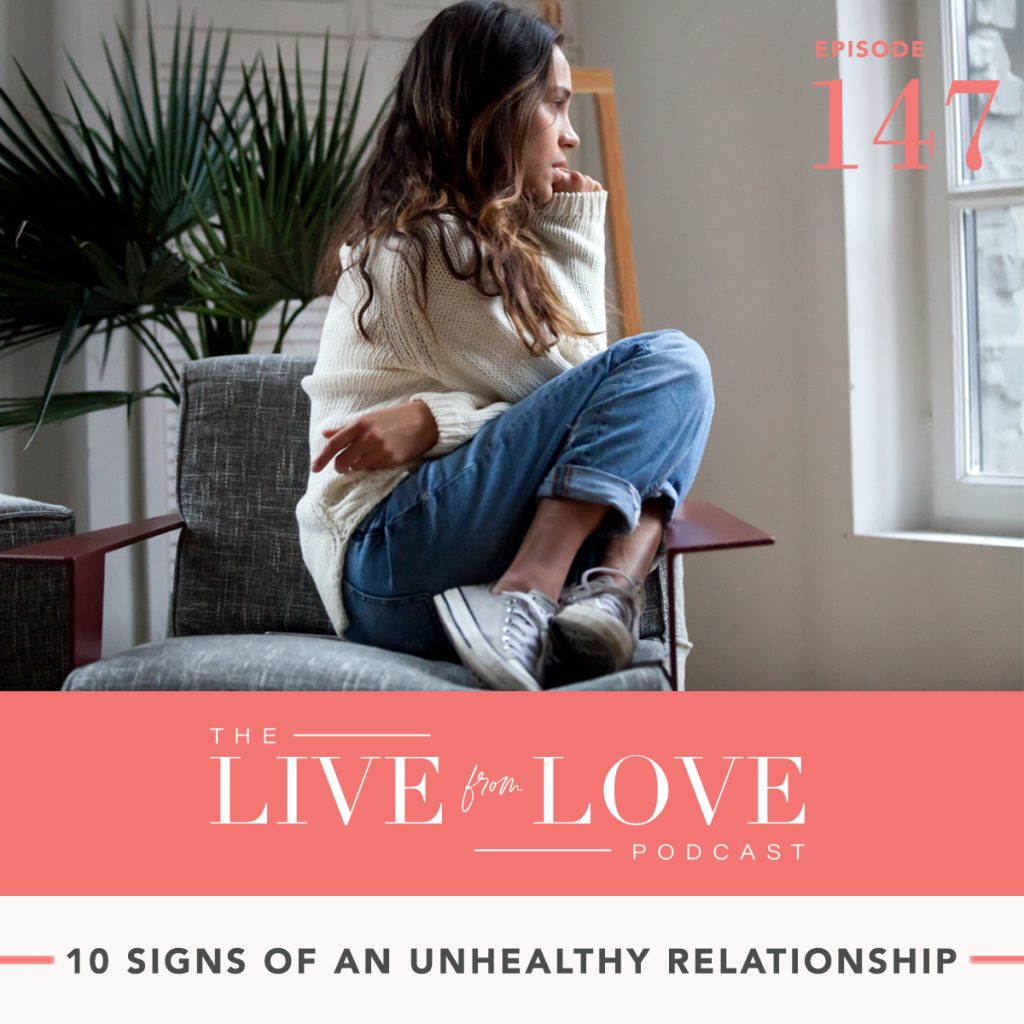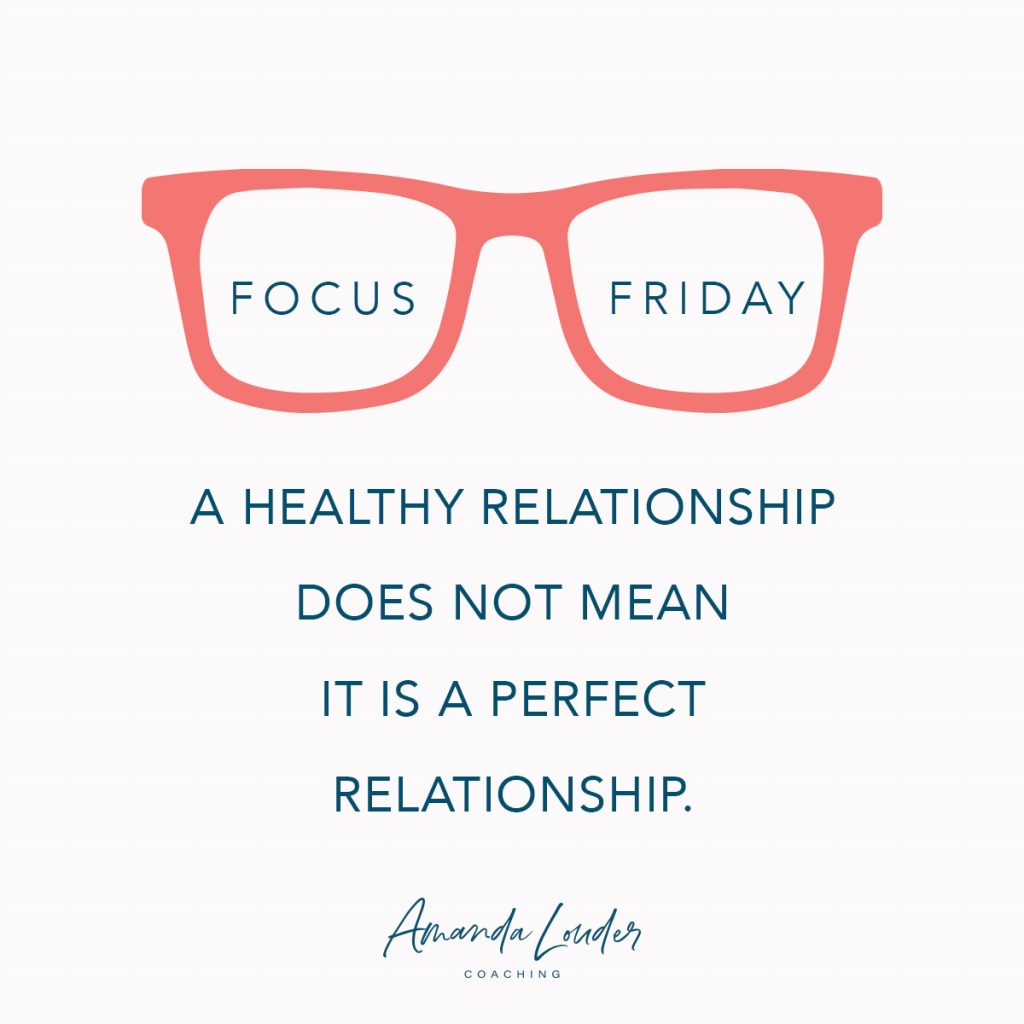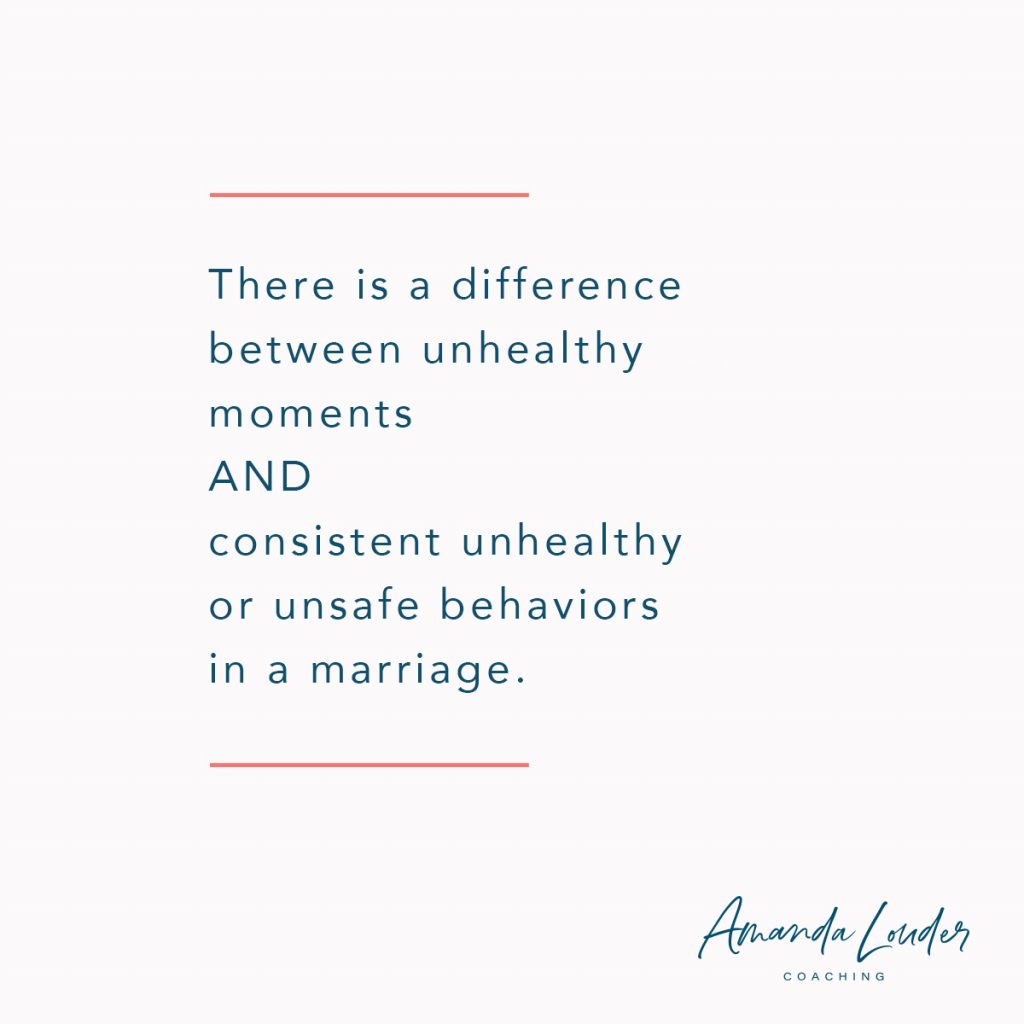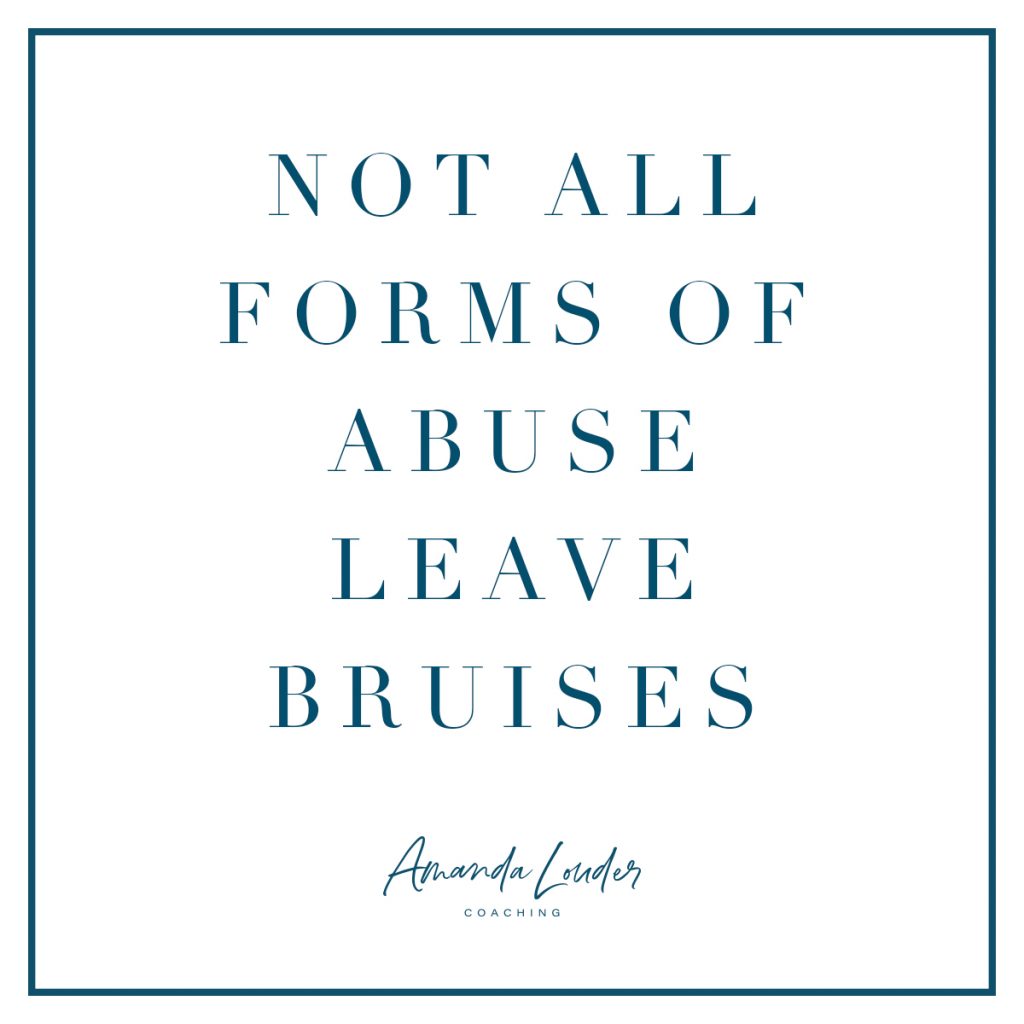
What does a healthy relationship look like? Today I will give you ten warning signs that you may need to examine. You may need to get some help or even get away from the relationship. I will also share ten areas where you can work together to make your relationship stronger. Join me today as we discuss ways you can become the person you want in your marriage and tips for building the long lasting and healthy relationship you are seeking.




Show Notes:
Follow Amanda on Facebook and Instagram.
Join Amanda’s Private Facebook Group.
References for this https://www.joinonelove.org
Show Summary:
I was recently asked to speak at a local conference to teenagers about healthy and unhealthy relationships. And I thought this would be a great podcast for adults too because while we often know that maybe parts of our relationship are unhealthy or healthy, we might not be able to pinpoint exactly why. I also think this is a great episode to discuss with your teens and adult children because we all need to know these things.
Relationships exist on a spectrum. We have healthy, unhealthy, and abusive. While everyone does unhealthy things sometimes, we can all learn to love better by recognizing healthy signs and shifting to healthy behaviors. If you are seeing signs of unhealthy behaviors in your relationship, it’s important not to ignore them. Many unhealthy signs over time can escalate and become abusive. If you are in a dangerous situation, please get help. You can call the domestic abuse national hotline at 1-800-799-SAFE.
If you would like to learn more about what abuse looks like, please listen to Episode 41 – Am I Being Abused?
But today, I’m going to talk about what unhealthy and healthy relationships look like. Now, this is different than the 6 Principles of Sexual Health that I discussed in Episode 94. Here we are talking about overall relationships. Healthy relationships are about two people who are both showing up in the best ways. Unhealthy relationships are also about 2 people showing up in unhealthy ways. Rather than being equal partners, there is often a power dynamic. And that is what we are going to discuss today.
So first, let’s discuss 10 signs of an unhealthy relationship.
- Intensity: If your partner expresses very extreme feelings and over-the-top behavior that feels overwhelming to you, this is a sign of an unhealthy relationship. High intensity relationships are formed when there is high risk and high drama. If you have a high level of uncertainty and either opportunity for high reward or high loss, this can be an intense relationship and that isn’t necessarily a good thing. What can this look like? Someone you just met lying or exaggerating. Maybe they insist you move quickly in the relationship. They want to get married quick or have kids right away. They work really hard to win over friends and family. They are over the top with things like expensive gifts or dates. They write intense love letters. They sweep you off of your feet. They bombard you with texts and emails. They call non-stop. While it may all seem very flattering at first, this is definitely a warning sign of things to come. Take it seriously.
- Possessiveness: When someone is jealous to the point where they try to control who you spend time with and what you do, this is not a good thing. They may come off as just wanting to be with you so much because they love you, but keeping you away from people and things that you love isn’t ok. Jealousy isn’t a good thing.
- Manipulation: If someone tries to control your decisions, actions or emotions this is manipulation and is not good in any relationship. Often it can seem that it is done with good intentions. They say they want what is best for you or they are willing to sacrifice their own happiness for yours. But this actually isn’t a good thing. If someone is trying to tell you how to dress, when to speak, or what to think, this is not ok. If they are showing up uninvited, not ok. If they are checking your cell phone, emails, Facebook, going through your belongings, this is not ok. If they are trying to coerce you to do things that are against your value system or trying to sexually coerce you, this is not ok. Manipulation can also look like people pleasing behaviors. If you partner is doing anything they can to get you to like them or do what they want, this is manipulation.
- Isolation: If someone is trying to keep you away from friends, family, or other people, this is a problem. Often they will point out faults and problems of the people they are trying to keep you away from and give you an ultimatum about seeing them. If they insist that you only spend time with them or make you dependent on them emotionally, psychologically or financially, this isn’t ok. If they forbid you to do something, again, not ok! In a healthy relationship, even if you don’t like particular people, you don’t forbid your partner to see them.
- Sabotage: If someone purposely ruins your reputation, achievements, or success, this is a problem. If they make you miss work or school by starting a fight or having a meltdown, that isn’t ok. If they are hiding your keys or your phone, that isn’t ok. If someone truly loves you they will want you to succeed and do your best.
- Belittling: If someone does and says things to try and make you feel bad about yourself, this is not ok. Of course we want our partner to be the best they can be. But helping them be their best comes from a place of love and building them up, not tearing them down. If they are calling you overweight, stupid, ugly, or crazy. If they are ridiculing your beliefs, ambitions or friends, this is not ok. If they tell you they are the only one who truly care about you or make you feel bad about yourself, that is NOT a loving relationship. They are brainwashing you to try and make you feel worthless.
- Guilting: When someone tries to make you feel responsible for their actions or makes you feel like it’s your job to keep them happy, they are wrong. Everyone is responsible for their own happiness and their own actions. You can’t MAKE anyone feel or act in certain ways. Each person has their own agency. Do not take responsibility for how others feels and act. So if they try to make you feel responsible for their aggressiveness or destructive behavior or blame you for their problems, saying things are your fault or you made them do this, that is absolutely NOT ok!
- Volatility: When someone has really strong, unpredictable reactions that make you feel scared, confused, or intimidated- this is a red flag and is not healthy. If they are overreacting to small problems, or frequently lose control, have violent outbursts or severe mood swings, get away. If they are threatening to hurt you or your loved ones, they are physically, emotionally, financially, spiritually, or sexually abusing you or make you feel afraid, get some help.
- Deflecting Responsibility: If someone is repeatedly making excuses for their unhealthy behavior, it’s always someone else’s fault and not their own, this is also a sign of an unhealthy relationship.
- Betrayal: If someone is disloyal or acts in an intentionally dishonest way, that is not ok.
A reminder that we all do unhealthy things sometimes. That doesn’t make us or someone else a bad person. But if you are seeing multiple issues and it’s happening over and over, they need to be addressed or you need to get away and end the relationship.
On the other hand, healthy relationships bring out the best in both people and make you feel good about yourself. A healthy relationship doesn’t mean a perfect relationship, but the behaviors I will talk about next are the ones you should strive for in all of your relationships. Healthy relationships manifest themselves as healthy communication, loving yourself, and loving the other person.
10 signs of a healthy relationship
- Comfortable Pace: The relationship moves at a speed that feels enjoyable for each person. You don’t feel rushed or pressured to do something you aren’t ready for.
- Trust: Trust is a very important part of any healthy relationship. To have confidence that your partner won’t do anything to hurt you or ruin the relationship feels good.
- Honesty: This goes both ways. You feel like you can be truthful and candid without fearing how the other person will respond and they feel the same about you.
- Independence: A lot of times when we get into a relationship we think we need to only be with each other. But one of the healthiest things you can do is have space to be yourself outside of the relationship. Be able to enjoy the things you want to enjoy with yourself and others.
- Respect: In a healthy relationship you value one another’s beliefs and opinions and love one another for who you are as a person and not just for who you want or expect them to be.
- Equality: Is your relationship balanced and everyone puts in the same effort into the success of the relationship? Do you have equal access to finances, activities, and alone time?
- Kindness: Are you both caring and empathetic to one another? Do you provide comfort and support?
- Taking Responsibility: This is a huge one! Owning your actions and your words. Avoid placing blame on others and admit when you make a mistake. Are you able to self-confront and recognize where you might need to make changes?
- Healthy Conflict: All relationships have conflict. But dealing with it openly and respectfully is important. You need to be able to discuss issues you are having and be able to disagree without making it mean something about you or your partner.
- Fun: Healthy relationships are fun! Can you enjoy spending time together and do you bring out the best in each other. Can you have fun in other ways besides being physical with each other (although that can be fun too!)
Now, as I am going through all these, if you are thinking “oh my gosh, this is happening in my relationship!” your relationship is not doomed. These are some of the things that we work on in my Embrace You! Group Coaching Program. A healthy sex life comes from a healthy sense of self and a healthy relationship. So that is why we work on all of this. Helping you become the person you want to be in the relationship (even if your spouse isn’t!) so that you can make your relationship better.



